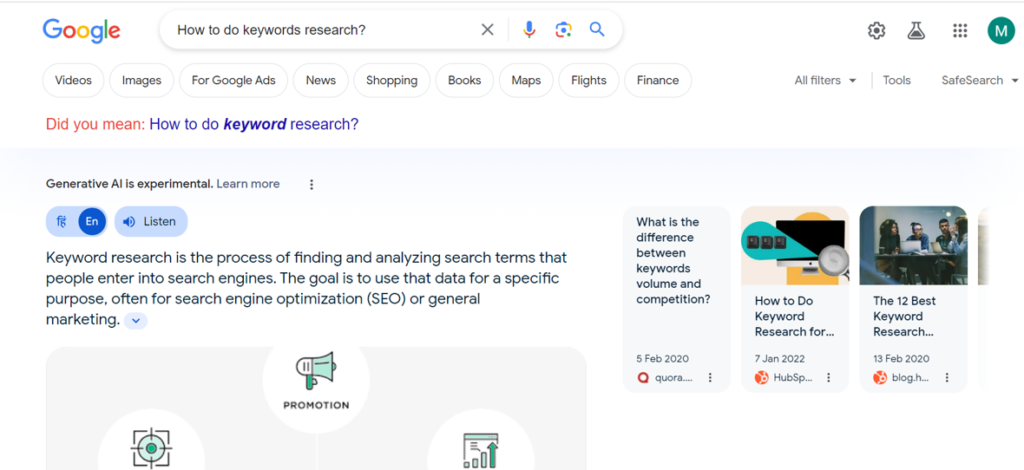
Introduction
Generative AI will transform the user search experience and have second-order impacts on the broader content and organic inbound marketing ecosystem. There is a high likelihood of traffic to the company websites reducing significantly, and the Go-to-Market (GTM) strategy needs to evolve to keep up with the changes.
We take a look at how generative AI will impact google search and content marketing.
What is a zero-click search?
A zero-click search enables users to get answers to their queries without clicking any links on the search engine results page. The users browse headlines, read snippets, and click on maps or local listings to get answers. According to a Zero-clicks study by SEMRush Zero, click searches have been trending over time, with over 50% of the searches being zero clicks in 2022.
The fast evolution of generative AI is driving Google towards more zero-click searches.
What is Search Generative Experience (SGE)?
Google Search Labs is conducting experiments, what it calls Search Generative Experience, to use Google LLM in search results. It combines reliable data from multiple organic search results and leverages Google LLM to turn the information into a prose answer to a user’s search. It dispenses the need for users to click any links on the search result page. 
Additionally, SGE provides users with an interactive or conversational interface to research the topic further without the need to click any link. It is the logical extension of the Google Featured Snippets Feature.
The future Google search results page devotes more space to search features and less to organic and paid search results. The current Google search results have more space for organic links, while the future limits the opportunity for organic content to be displayed on the search result page. It will also impact Google’s revenue from search ads, which Google has to bear to counter its competitors.
What is the significant change in search results in future Google search pages?
The organic links or the search results cited by SGE differ from those at the top of traditional search results. According to insights partner research, only 57% of the links cited by SGE are from the first page of the organic search results. The first organic search results or the link in SGE is the same as the first (traditional) organic link only 12% of the time. What it means is that there is no guarantee that the top organic search results appearing on Google’s page will get a similar ranking in future once Google LLM is integrated into its search product.
As users start switching their reading habits and clicking behaviour, it could result in web traffic and visits. Once Google rolls out their search algorithm update with LLM, businesses will require new on-page, off-page, and technical SEO.
How will Generative AI impact search traffic?
The evolution of internet search towards zero-click work may lead to less web traffic to your website. According to the Insight research, the expected traffic drop will be in the range of 15 to 25%. Some of the traffic loss could be the low-value traffic that would never convert into revenue.
What will be the impact on CTR (Click Through Rates)?
CTR will decline as SGE with better context to users and search results derived from multiple organic sources. SGE allows users to ask follow-up questions in a conversational format which further reduces the user’s reliance on organic search results or the links for comprehensive answers to their queries.
Web traffic drives multiple aspects of your GTM strategy. With CTR decline the lead quantity may go down even if the quality goes up. The accuracy of leads may be reduced if more research is done offline.
How SGE will change content strategy?
Content teams need to test different content copies to test the efficacy and figure out the content that ranks high in SGE and gets clicks. It may involve creating different copies of a title by incorporating different content elements and applying AB testing principles to determine the best-performing content. It may require the content team to focus on new media types like video or podcasts or incorporate differentiating content sourced from independent research using company data.
The content team must also experiment by syndicating content into more third-party platforms and enhancing their presence on platforms such as Quora, Reddit and others. Precision will be important more than anything else, and engagement will assume greater significance in Google searches.
Businesses must start factoring in changes in Google search with the addition of LLM in its search algorithm. The search and content teams need to track SGE developments and assess their impact on their search and content strategy. The first reaction of business has been to reduce costs by leveraging generative AI for content development. However, they will be missing out on long-term if they don’t use the first mover advantage by experimenting with different content copy to prepare for the future of Google search. You can sign up to test SGE and access it in Google Search Labs.
